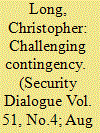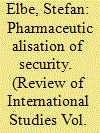|
|
|
Sort Order |
|
|
|
Items / Page
|
|
|
|
|
|
|
| Srl | Item |
| 1 |
ID:
174715


|
|
|
|
|
| Summary/Abstract |
Understandings of the nature or inherent workings of molecular life in the field of biopolitical security studies have today been characterized predominantly in terms of contingency. This article challenges this characterization. It does so by identifying a particular logic of operation that organizes political action and intervention at both the level of the population and the molecular in response to the threats of smallpox, Ebola and pandemic influenza. It argues that, in fact, rather than securing by instantiating a general economy of the contingent, governing practices rely upon the characterization of the nature of molecular life in terms of its constant biological dynamics. Governments around the world, and the US government in particular, have reacted to the increased likelihood of the emergence of disease through the stockpiling of new pharmaceuticals, including the antivirals ST-246, ZMapp and Tamiflu. Antivirals represent a pharmaceutical tool stockpiled by governments to ensure that they can respond to the emergence of novel biological threats. The characterization of the nature of molecular life in terms of its constant biological dynamics is so important, then, as it is this that underpins political programmes of preparedness that utilize antivirals in the prevention of disease.
|
|
|
|
|
|
|
|
|
|
|
|
|
|
|
|
| 2 |
ID:
141063


|
|
|
|
|
| Summary/Abstract |
Pharmaceuticals are now critical to the security of populations. Antivirals, antibiotics, next-generation vaccines, and antitoxins are just some of the new ‘medical countermeasures’ that governments are stockpiling in order to defend their populations against the threat of pandemics and bioterrorism. How has security policy come to be so deeply imbricated with pharmaceutical logics and solutions? This article captures, maps, and analyses the ‘pharmaceuticalisation’ of security. Through an in-depth analysis of the prominent antiviral medication Tamiflu, it shows that this pharmaceutical turn in security policy is intimately bound up with the rise of a molecular vision of life promulgated by the biomedical sciences. Caught in the crosshairs of powerful commercial, political, and regulatory pressures, governments are embracing a molecular biomedicine promising to secure populations pharmaceutically in the twenty-first century. If that is true, then the established disciplinary view of health as a predominantly secondary matter of ‘low’ international politics is mistaken. On the contrary, the social forces of health and biomedicine are powerful enough to influence the core practices of international politics – even those of security. For a discipline long accustomed to studying macrolevel processes and systemic structures, it is in the end also our knowledge of the minute morass of molecules that shapes international relations.
|
|
|
|
|
|
|
|
|
|
|
|
|
|
|
|
|
|
|
|
|